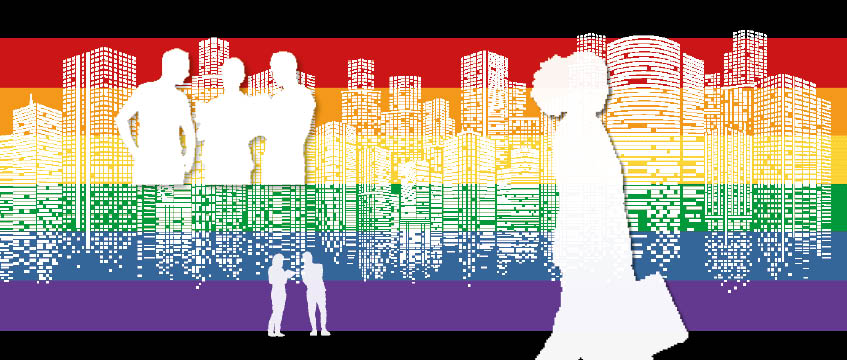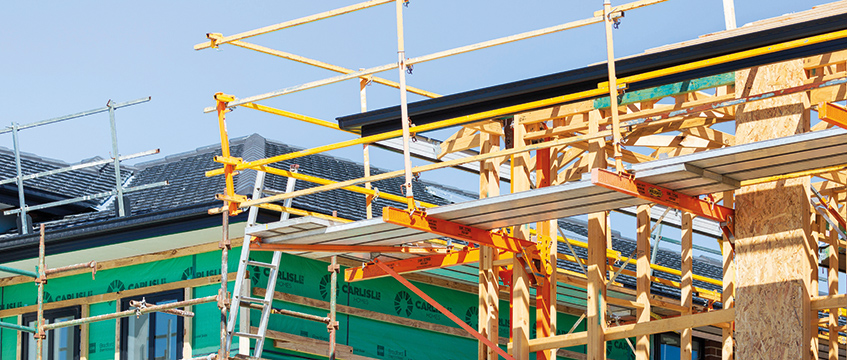The story of the founding of industry LGBTQ+ network Freehold is a well told one. Property lawyer Saleem Fazal was walking along Clapham High Street in London on an August evening and saw surveyor David Mann drinking outside one of the area’s gay bars.
They had both been to lunch together earlier in the week and had no idea either man was gay. In that moment, they knew they needed to launch a platform for property’s LGBTQ+ community.
The problem was, they were told as they visited the big consultancies to launch Freehold, there just weren’t any LGBTQ+ people in property.
There were, of course. They just didn’t feel comfortable, safe even, being out at work.
Continuing transformation
Thankfully, real estate has come a long way since the founding of Freehold in 2011. And, while EG’s latest LGBTQ+ Attitudes & Actions in Real Estate survey shows that there is still plenty of work to be done to make the sector a truly inclusive place for LGBTQ+ people, each year the sector is getting a little bit better.
Since EG began the survey in 2017, the percentage of respondents saying they were out at work has risen from 70% to 76.1% this year. With the percentage of respondents being out to clients, or feeling comfortable enough to be, rising from just 28% to more than 52%. Numbers peaked in 2019 when almost 80% of respondents said they were out at work and fell to a low of 64.3% in the wake of the coronavirus pandemic in 2021.
84.1% This year the highest percentage of respondents since 2019 said they believed their firm provided a safe place for LGBTQ+ people
44.3% 44.3% of respondents this year said they felt the advisory side of the sector was more inclusive than the client side (32%), with the advisory side of businesses taking more actions to improve inclusivity
73.2% Almost three-quarters of respondents to the survey, the majority of which identify as LGBTQ+, said they would recommend the industry as a good place to work to the LGBTQ+ community
23.8% While the volume of respondents that believe enough action is being taken across the industry has increased to 23.8% in 2023, more than three-quarters of respondents think more needs to be done
The sector’s work on promoting inclusion has also been recognised over the years with less than a fifth of respondents thinking enough was being done back in 2017, to almost one-quarter now believing inclusion is being promoted. Still plenty more improvement is needed, however.
This year the highest percentage of respondents since 2019 said they believed their firm provided a safe place for LGBTQ+ people – some 84.1%. This was up from 77.7% in 2017 and 80% in 2021 and 2022. 2019 was an outlier year with 87.6% of respondents feeling that real estate was a safe place for LGBTQ+ people.
The big reason for real estate to start to be a little bit proud of the ED&I transformation it continues to go through, however, is that almost three-quarters (73.2%) of respondents to the survey, the majority of whom identify as LGBTQ+, said they would recommend the industry as a good place to work to the LGBTQ+ community.
“I believe there has been significant progress over the last decade,” wrote one survey respondent.
“Freehold has certainly helped. Things cannot change overnight but there are many allies today.”
While the feeling that real estate is changing – for the better – is growing among respondents, there were still many areas of the sector that people felt were lagging behind and an appreciation that while attitudes and actions towards lesbian and gay individuals (particularly gay men) had improved, support for trans and non-binary people remained some way behind.
Toxic transactions departments
Since EG began its survey six years ago, transactions has been highlighted as the toughest area to work in for LGBTQ+ professionals in the real estate sector.
Around half of respondents label transactions and capital markets as the least inclusive part of the sector, a percentage that has barely shifted since 2017 – 51.4% to 48% this year. Only 9.7% of respondents said that from a diversity & inclusion perspective they would prefer to work in transactions, with the majority (35.4%), choosing consultancy.
Comments shared throughout the anonymous survey call out the transactional market as not a place for gay people, that transaction departments are still “old fashioned boys clubs”, are “more exclusively male with a laddish culture”, and are generally less inclusive.
41% The percentage of respondents answering yes to “Are there any exemplars in the industry?” fell from 41% last year to 30% this year
60% Those answering “don’t know” rose from 50% to almost 60%, indicating that firms that feel they are doing good work on ED&I need to communicate that work better
10% Some 10% of respondents said there were no firms leading the way
“My experience of the ‘chase the deal’ toxic alpha male agent is they squeeze the air out of rooms,” said one respondent, “leaving no space for any diversity and anyone that challenges their position.”
Conversely, 44.3% of respondents this year said they felt that the advisory side of the sector was more inclusive than client side (32%), with the advisory side of the business taking more actions to improve inclusivity.
While the volume of respondents believing that enough action is being taken across the industry has increased to 23.8% in 2023, more than three-quarters of respondents think more needs to be done.
Leading on allyship
Chief among those actions was having more visible allies and more role models and better leadership from both business leaders and industry bodies.
“While having role models both within the firm, nationally and in society in general is good for making it become more accepted within society, the overall LGBTQ+ community is still a minority proportion of the population,” writes a survey respondent.
“We need more visible allies who can help support friends, family members or strangers if they hear someone being abused and highlight why this is wrong, report any abuse so it is investigated and help support those within the LGBTQ+ community in general by showing they care and want to make a better society for all.
“Leadership from business leaders/industry bodies needs to significantly improve rather than just being a token gesture… While not every report of abuse needs to end in a disciplinary case, an LGBTQ+ person wants to feel they have been listened to, understood and their issue taken seriously.”
Another added: “It is really important that we continue to raise awareness and visibility of the LGBTQ+ community. We have a massive role to play in the built environment sector to enable and support local communities to feel safe and have good levels of wellbeing no matter background or difference. Being proactive in this area and designing/building/managing places so they are inclusive for everyone is key.”
Main reasons stopping LGBTQ+ people being out at work
- Lack of visible role models in the workplace
- Negative impact on career development Negative reaction of clients
- Negative reaction of colleagues
- Poor/unenforced policies promoting diversity & inclusion
- It isn’t anyone else’s business Lack of support in the workplace
- Lack of formal process for reporting abuse
Must try harder
Views were also shared on what the industry could do to continue to shift the dial in the right direction, including delivering more events where experiences are shared – positive and negative – to help create safe spaces to speak out and bring down barriers; to make anti-discrimination training mandatory for all employees; and to ensure that all aspects and geographies of the built environment have access to training and networks.
Survey respondents did note, however, that significant changes were taking place within their firms to support LGBTQ+ inclusivity, including delivering HR policies that promote diversity and inclusion, and much more visible support from C-suite level.
For the second year, EG asked respondents to name any firms that were exemplars in the industry in terms of their attitudes and actions towards the LGBTQ+ community. Some 21 companies were individually name checked (see box, below), with multiple nominations for Grosvenor, Landsec, Westfield and JLL.
Leading the way
Some 21 firms were singled-out as exemplars in LGBTQ+ inclusivity in this year’s survey, with multiple nominations for several firms.
Overall, however, the percentage of respondents thinking there were any standout firms in real estate fell by more than 10 percentage points to 30%. The 21 firms identified for praise were:
- British Land
- CBRE
- Cushman & Wakefield
- Eastlight Community Homes
- Feix&Merlin Architects
- Gerald Eve
- Grosvenor
- Hogan Lovells
- JLL
- Landsec
- Lendlease
- Mishcon de Reya
- Montagu Evans
- Mount Anvil
- NLA
- Pinsent Masons
- Savills
- Shaftesbury
- Taylor Wessing
- TFT
- Westfield
Overall, however the percentage of respondents answering yes to “Are there any exemplars in the industry?” fell from 41% last year to 30% this year. Those answering “don’t know” rose from 50% to almost 60%, indicating that firms that feel they are doing good work on ED&I need to communicate that work better.
Some 10% of respondents said there were no firms leading the way and for every comment about a business that was welcoming and positive, there was another sharing stories of toxic cultures, of being told they had been overlooked because of their sexuality and of hiding who they were for fear of not being accepted.
Overall, the message from this year’s survey is that even though the industry is moving forward, certain departments need to work harder than others and the job is still far from being done. But experiences of negative reactions and microaggressions are declining and real estate is feeling like a safer place in which to be oneself.
To move the results further forward, the industry needs to show its colours more brightly. It needs to showcase the positive actions it is taking, lift up its role models and allies, and share its journey so others can follow.
To send feedback, e-mail samantha.mcclary@eg.co.uk or tweet @samanthamcclary or @EGPropertyNews











